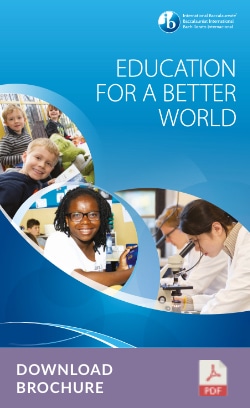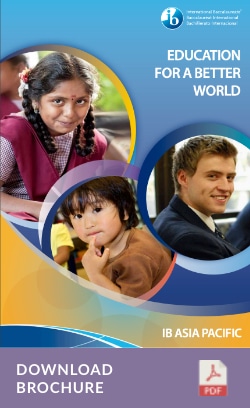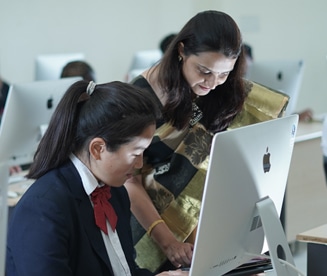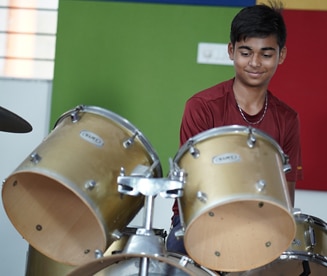IB PRIMARY YEARS PROGRAMME

The PYP is an authentic inquiry-based learning and teaching programme that is engaging, significant, challenging and relevant.
IB Primary Years Programme aims to empower young students to think, question, research, collaborate and present their findings. Hence, the focus is on the following:
- Developing a Transdisciplinary understanding,
- Understanding the connectedness of various knowledge concepts,
- Making connections with the external world and;
- Developing intercultural understanding, respect of different perspectives and developing personal knowledge.
Why PYP?
EISB is one of the best IB Schools and is known for offering a programme that offers an inquiry-based and concept-driven transdisciplinary model of learning and teaching, supported by a strong understanding of how students learn.
PYP students develop knowledge, conceptual understanding, skills and the attributes of the IB Learner Profile to make a positive difference in their own lives, their communities, and beyond.
Students also demonstrate the agility and imagination to respond to new and unexpected challenges and opportunities and to take action for a better and more peaceful world.
Schools who choose to implement the PYP will develop the students’ academic, social and emotional wellbeing, focusing on international-mindedness and a sense of belonging to local and global communities. The PYP nurtures independent and collaborative learners, encouraging every student to have voice, choice and ownership in their own learning.
The IB learner profile represents a broad range of human capacities and responsibilities that encompass intellectual, personal, emotional and social growth. Developing and demonstrating the attributes of the learner profile provides an important foundation for international mindedness.
The IB learner profile permeates all facets of school life in the Primary Years Programme (PYP). All members of the learning community from the youngest learners to educators, school leaders, parents, and beyond, have a responsibility to be guided by and demonstrate a commitment to the development and demonstration of the IB learner profile. The PYP offers opportunities to inquire into human commonalities through units of inquiry and daily practices. The daily living of the learner profile facilitates students’ understanding of self, openness to others and builds their international-mindedness.
Through the programme’s commitment to transdisciplinary learning, students learn to appreciate knowledge, conceptual understandings, skills and personal attributes as a connected whole.
The transdisciplinary themes that are used to organize the curriculum, mark the starting point of student inquiries. They provide authentic and real-life contexts for students to explore and engage with rich dialogues and ongoing collaboration to build an understanding of themselves, their wider community and the world.
Students reflect on the significance of their learning to take meaningful action in their community and beyond. Through this process of learning in the PYP, students become competent learners who have the cognitive, affective and social tools to engage in lifelong learning.
The PYP acknowledges the unique needs of early learners, aged 3 to 6 years. It is a distinguishing feature of the programme which recognizes that learners in this age range require approaches that honor their developmental stage, and the importance of play as the vehicle for inquiry. Since experiences during the early years lay the foundation for all future learning, the PYP framework allows educators to make choices to best enable learners to flourish.
Early learning in the PYP is a holistic learning experience that integrates socio-emotional, physical and cognitive development. In the PYP classroom, it takes place in dynamic environments that promote play, discovery and exploration.
Students from the age of 7, have the opportunity to learn more than one language to support the development of multilingualism and promote intercultural understanding.
A multilingual approach acknowledges that it is crucial for both the cognitive development and maintenance of cultural identity for a learner to be able to express themselves in all languages they use to interact with the world.
The PYP delivers excellent outcomes for students aged 3 to 12. For example:
- PYP students outperformed non-IB students in mathematics, reading and writing in a global International Schools’ Assessment study that ran from 2009-2011
- A 2014 national study in Australia found that students in the PYP perform better than the national average in nationwide science tests
- New research in 2020 shows positive impacts of the PYP to school climate.
IB PYP at Ebenezer International School, Bangalore
These are the foundation years of education, where various skills, attitudes, and concepts are developed. We recognise that children at this level have their own unique abilities, interests, aspirations, and expectations. Therefore, our curriculum in these classes is structured to imbibe and practice the IB Learner Profile by being Inquirers, Knowledgeable, Caring, Open-minded, Principled and Reflective.
As a EISB student, your child will spark a lifelong love of learning, build a supportive community and be challenged to grow both intellectually and personally.
At EISB, one of the best IB Schools in Bangalore, students engage and inquire on a daily basis, learning to explore, hypothesize, collect evidence and communicate conclusions. They become thoughtful, inquisitive learners who can assess and thrive in challenging situations.
Assessment in PYP is a continuous process of gathering, analysing, reflecting and acting on evidence of student learning to inform teaching. Assessment involves teachers and students collaborating to monitor, document, measure, report and adjust learning.
The learners are assessed based on the acquisition of knowledge, understanding of the concepts and the development of skills over a period of time. The success criteria are either known to the students or are co-constructed with the learners, allowing them to be involved in the learning process and taking ownership of their own learning.
The learning outcomes will be tracked by assessing the child’s prior knowledge, frequent formative and summative assessments.
Students’ work will be monitored, measured,displayed and celebrated using the different forms of reporting such as recorded observations, selected responses (quizzes,MCQ’s), performance assessments (reports, presentations), portfolios, learning celebration (culmination), student-led conferences and self & peer assessment.
The purpose of assessment is to encourage student learning, give information about student learning and contribute to the successful implementation of the programme.
Looking for IB Board School in Bangalore? Visit Ebenezer International School today!
Units of Inquiry
English
Science
Mathematics
Social Studies
French
Hindi
Kannada
ICT
Robotics
Music
Visual Arts
Dance
Drama
PE
Swimming
Sports
Periodic assessments are conducted and students are graded based on their performances. School follows a system of continuous evaluation and regularly provides parents with an assessment of their child’s academic & social progress, based on a comprehensive system of reviews, reports and parent-teacher meetings.
The PYP approach to assessment recognises the importance of assessing the process of inquiry as well as the product(s) of inquiry, and aims to integrate and support both.
At EISB, we believe that assessment provides information through its diagnostic, formative and summative components. Assessment is ongoing, authentic, varied and purposeful. It is a collaborative and informative process that involves students, families, teachers and community. Instructional and curricular decision making is driven by our assessments.





